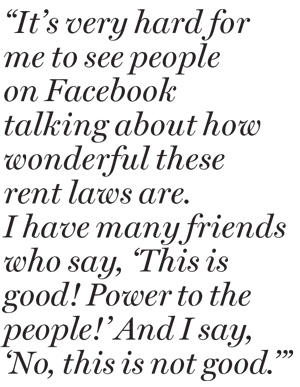Rental reform. A proposed cap on commissions. VC-backed rivals. The Real Deal talked to six players in New York City’s residential space about the new pain points they’re feeling in a sector that’s getting squeezed from all sides. Below is Sarah Saltzberg’s account of how she got into the business and how it’s changing.
Read the full story — “Tales from the front lines” — here.
Sarah Saltzberg
Bohemia Realty Group
 Sarah Saltzberg came to New York to make it as an actor, and only started working in real estate to earn some extra money. Today, Bohemia Realty Group, the boutique firm she founded in 2012, has 150 agents specializing in properties above 96th Street. The firm’s bread and butter is rentals between $2,000 and $3,000 and sales in the $750,000-to-$1 million range. Saltzberg talked to TRD’s Sylvia Varnham O’Regan about what’s at stake for her business with the new rent regulation laws.
Sarah Saltzberg came to New York to make it as an actor, and only started working in real estate to earn some extra money. Today, Bohemia Realty Group, the boutique firm she founded in 2012, has 150 agents specializing in properties above 96th Street. The firm’s bread and butter is rentals between $2,000 and $3,000 and sales in the $750,000-to-$1 million range. Saltzberg talked to TRD’s Sylvia Varnham O’Regan about what’s at stake for her business with the new rent regulation laws.

Sarah Saltzberg
I came to New York from Boston in 1998. At the time, I was involved in theater and creating a show. I was trying to put money into the show and was waitressing eight or nine shifts a week. I had a friend who was also an actor who had gotten into real estate and was like, “You would be great at this.” I turned my nose up and I was like, “I’m an artist, okay?”
After some careful consideration, I thought, “You know what? I’m going to do it for the summer.” I approached my landlord, because I knew there were a bunch of vacancies in my building. I called him and I said, “Hi, I’m a tenant of yours, I just got my real estate salesperson license and I would love to show the apartments in your building.” He hung up.
Once we opened the show — “The 25th Annual Putnam County Spelling Bee” — on Broadway in 2005, one of my castmates said, ‘This seems amazing. I think I’m going to get my real estate license.” We would do our matinee on Saturday, run up to Harlem, show apartments, come back for our evening shows, and do the same thing on Sunday. We opened Bohemia Realty Group on Feb. 1, 2012.
The new state law — where building owners need 51 percent of rent-stabilized tenants to go into contract in order to convert to condo — means that these conversions will now never happen. You used to need 15 percent, which, quite frankly, was challenging enough. You’re taking away an opportunity for people to own their homes. That is a terrible, terrible thing.
I really don’t understand why that change was made, but it certainly is impacting my business because we had plans in the pipeline to do the conversions: working with sponsors and guiding them through the process, working with lawyers, making sure everything is done by the book, drafting the Schedule A prices. We’re not going to do them now. Those buildings will stay rental.
I would like to have quality of life where I’m not just surviving. The money that would have come in for us on these conversions would have been very helpful for a business like mine. To say that we will not feel that loss would not be accurate.
The Individual Apartment Increase is now capped at $15,000 over 15 years, which will also impact us. First of all, what can you get for $15,000? Part of a new bathroom? It doesn’t make sense. I think those of us in the brokerage community are really fearful that the housing stock is going to deteriorate, because there’s just no incentive for these owners to do improvements.
We definitely have less on the market than we did this time last year. Our resales and our new developments are still moving along, but the conversions, which we projected to be a huge chunk of our business, have now completely stopped. It means figuring out other opportunities for our owners and ourselves. We have a lot of owners who are thinking of selling up and moving out of the city.
I also testified to the City Council about the proposed cap on rental commissions. I think those proposals — like with the legislation in Albany — show a fundamental misunderstanding of what we do. That’s why it is so important for us to explain how pulling out one piece of it is like a Jenga puzzle. Elected officials and advocates don’t understand that by changing that one thing, it affects all of these other components.
It’s very hard for me to see people on Facebook talking about how wonderful these rent laws are. I have many friends who say, “This is good! Power to the people!” And I say, “No, this is not good.” I understand we are culturally in a moment where people feel like big business and corruption are winning, and so something like this could feel like a victory for the 99 percent of everyday, working-class New Yorkers. But it’s not.”
